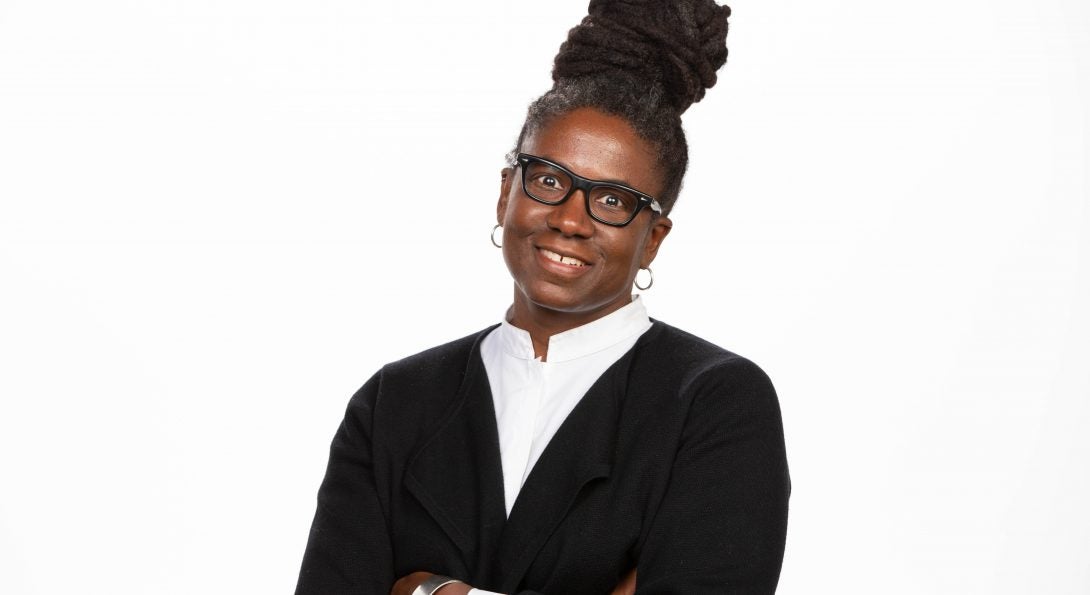UIC’s Stacey Sutton recognized for support of social justice and communities of color

x
The College of Urban Planning and Public Affairs has named Stacey Sutton, associate professor of urban planning and policy, as recipient of the 2021 Edward Blakely Award, bestowed by the Planners of Color Interest Group of the Association of Collegiate Schools of Planning.
The Edward Blakely Award is given to an honoree who has supported the cause of social justice, particularly in urban planning or development, for communities of color. The award recognizes dedication to the cause of social justice, particularly for communities of color; creative or path-breaking approaches to pursuing such ends; and outstanding service/accomplishment in urban planning or development.
“I am honored to be the 2021 Edward Blakely Award recipient. This award validates my commitment to racial and economic justice and the myriad possibilities for activist scholarship,” Sutton said.
“Stacey’s combination of activist-research and institution building is a model of impactful, engaged scholarship that is driven by core commitments to social equity and racial justice. Likewise, her search for alternatives to unjust systems, pursued in partnership with affected communities, is an example of how urban planning scholarship can broaden our horizons for action,” said Nik Theodore, urban planning and policy department head and professor.
In addition to her associate professor appointment, Sutton is also the director of applied research and strategic partnerships at UIC’s Social Justice Initiative. Her scholarship and teaching are in community economic development with a central focus on racial and economic justice; economic democracy and worker-owned cooperatives; movement building and the solidarity economy; gentrification and dispossession; neighborhood small business dynamics; and disparate effects of punitive city policy.
Her frameworks for research and community engagement entail advancing “cooperative cities” and the solidarity economy and critiquing “punitive cities.” In a recent study of cooperative cities, Sutton examines how local governments in 12 cities are creating enabling environments for worker cooperatives and community wealth building by supporting the development and sustainability of worker-owned enterprises and deepening the cooperative ecosystem. Through the Real Black Utopias Project, Sutton’s latest cooperative city research, she explores infrastructures, ideologies, and practices of Black-led cooperatives and solidarity economy ecosystems.
“’Punitive cities’ encapsulates my research and community engagement concerned with racially disparate effects of universal city policies and place-based initiatives,” Sutton said. “This includes studies such as the distributional effects of automated enforcement red-light and speed cameras, and the economic burden of camera ticket fines and fees for Black, Latinx and low-income Chicago residents. It also includes studies of racial transition amid gentrification; the impact of business improvement districts on small businesses in New York City; and how municipal enforcement of mundane land-use rules, building codes, ordinances and regulations hastens shuttering and displacement of on neighborhood small businesses.”
Sutton partners with grassroots and community organizations committed to racial and economic justice, equitable development, anti-displacement, participatory democracy and cooperative economics. She has led American Planning Association award-winning student projects for the Plan Making Studio course in UIC’s Urban Planning Department and co-developed feasibility studies for community partners in her Solidarity Economy course.
She served as the principal investigator of a Mellon Foundation Sawyer Seminar (entitled Urban Edges – Dreams, Divisions, and Infrastructures: Comparative Cross-Disciplinary Dialogues about 21st Century American Cities) that brought together leaders within and beyond the academy to advance visions of more just and equitable cities. Sutton has supported the work of numerous community organizations in Chicago and was appointed to the Community Wealth Building Working Group, Office of Equity and Racial Justice in the City of Chicago’s Office of the Mayor.
As part of the Social Justice Initiative’s Portal Project and Maroon University, Sutton is deliberating and strategizing with scholars, organizers, researchers and artists from across the county around daunting questions such as how society moves from injustice to justice, what sustainable transformative change might look like, and strategies for bridging knowledge production in the academy and the work of organizers in communities.
“Over the course of two-years, we will interrogate ‘the moment, the movement, and the future’ emphasizing three critical and interconnected domains of struggle: Abolition, Economic Democracy/Racial Capitalism, and Climate/Environmental Justice,” she said.
Sutton received her Bachelor of Art degree from Loyola University in Baltimore, Master of Business Administration from New York University, Master of Science from the New School for Social Research, and a joint Ph.D. in Urban Planning and Sociology from Rutgers University.
She currently teaches a number of courses at CUPPA, including “Researching the City,” “Urban Space, Place and Institutions,” “Plan Making Studio” and “Solidarity Economy: Policies and Practices.”